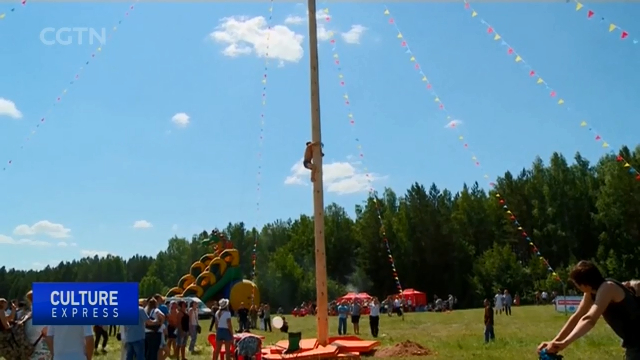
19:11, 03-Jul-2018
Sabantuy: Thousands in Russia celebrate ancient Tatar festival
Updated
18:50, 06-Jul-2018
02:23

Russians are celebrating an ancient festival which commemorates the end of the spring planting. It's a time for everyone to let their hair down and party.
This is what Sabantuy looks like.
It's an ancient holiday of Bashkirs and Tatars, people who originated from the Ural and Caucasus mountains near eastern Siberia.
This year there is a new activity on the list: the wild goose chase.
The geese are named after favourite football stars, some of whom are playing in the world cup.
"We just came to the festival and straight away saw the goose races, we liked it very much."
The celebration is a very old tradition among farming communities going back to the times when Bashkir and Tatar nations were roaming tribes.
More traditional entertainment includes climbing up a vertical pole.
According to the rules, you need to climb a smooth polished pillar 19.5 meters high to the very top.
DMITRY LUZHETSKY JUDGE OF THE CLIMBING POLE COMPETITION "Those people who reach the top they have some experience, they've been doing it for quite a long time. Everybody has their own techniques, some pour water on themselves, some climb up without clothes, everybody has a different approach."
Another sport which has seen little change is a form of wrestling called Koresh.
There are all sorts of sports here, horse riding, climbing and lifting weights. Sabantuy also features performances of cultural musical groups, dances and demonstrations of arts and handicrafts.
Although special to the Tartars and Tatarstan, Sabantuy is growing in popularity and is now being celebrated by other Russian communities.
ILSEN SHAKIRYANOV PARTICIPANT "This (festival) has been going for a long time, after the spring field work has ended. 'Saban' means plough, 'tuy' means celebration. Such events take place every year everywhere. It's now happening in all areas, but mainly in the Urals, this is a celebration of Bashkirs and Tatars."
Sabantuy is now a well known holiday and the event is included in UNESCO's Intangible Cultural Heritage list to safeguard the tradition. SL, CGTN.

SITEMAP
Copyright © 2018 CGTN. Beijing ICP prepared NO.16065310-3
Copyright © 2018 CGTN. Beijing ICP prepared NO.16065310-3